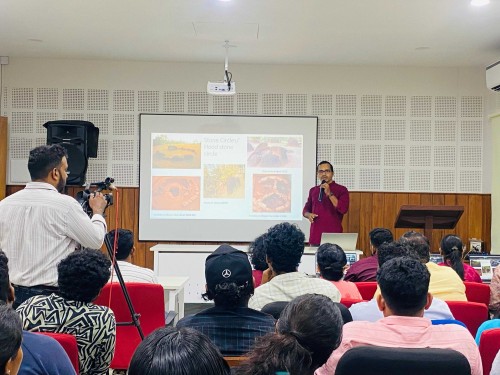Public Talk - 200 Years of Babington’s Pandoo Coolies: A Critique of the Megalithic Studies in Kerala by Dr K.P. Rajesh

200 Years of Babington’s Pandoo Coolies: A Critique of the Megalithic Studies in Kerala
by
Dr K.P. Rajesh
Assistant Professor, Department of History, NSS College, Manjeri
Date and Time: 11th January 2024, Thursday, 3.15 PM (IST)
Venue: Multimedia Classroom, Department of Archaeology, University of Kerala
Abstract: Megaliths, the large stone structures built in memory of the dead ancestors, are the foremost material evidence for the study of Iron Age and Early Historic periods of peninsular India in general and Kerala in particular. The studies on megaliths in India started with the antiquarian research of J. Babington at Chataperambah (Chattappraramb), near Farook, Calicut dist., in 1819. The report of the same was published in 1823 as “Description of the Pandoo Coolies in Malabar: with four drawings,” in Transactions of the Literary Society of Bombay, (1823: 3:324-330). Babington did not term the monument as Megalith, instead he called it as Pandoo Coolies, probably the anglicised version of local traditions such as Pandu Kuzhi or Pandavar Kuzhi. The present paper attempts to critically analyse the nature of megalithic studies in Kerala for the last two centuries after Babington’s study and argues that it is still remaining in some sort of antiquarian stage.
About the speaker: Dr K. P. Rajesh is Assistant Professor in History, NSS College Manjeri (Affiliated to University of Calicut). His areas of interests include social history of pre-modern Kerala, cultural studies, archaeology, epigraphy and local history. He has submitted a Minor Research Project (UGC) on Archaeology of Iron Age burial of North Malabar, Kerala, India: A Cognitive Analysis (2016). He has published research articles on various aspects of Megaliths of Kerala in the Heritage: Journal of Multidisciplinary Studies in Archaeology (2: 2014: 383-404, 5: 2017: 486‐506, 7: 2019: 352-372). Also published three books; Vadakkan Malabar Samuhavum Charithravum (SPCS 2014), Muthumakkathazhi (SPCS 2014) and Charithramurangunna Manushyanirmmithikal (Fabian Books 2022).
